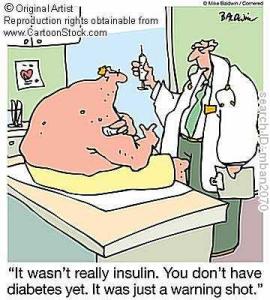The temptations of eating junk food is like having an itch that you can’t scratch.
Well, it’s time to man up, sweet cheeks.
The food you eat goes beyond the salivating taste in your mouth. In fact, food even supplies much more than just fuel for your body to function properly. It provides the raw materials from which your skin, hair, muscle, bone, and all other tissues are made of. Your diet provides nutrients that are necessary to manufacture hormones and enzymes that control the function of every single cell in your body. Your body also uses these nutrients to make neurotransmitters that regulate how you think and feel.In other words, cut the crap and start fueling your body with a proper balance of macronutrients (protein, carbohydrates, and fat) and micronutrients (vitamins, minerals, and other food components) which are all crucial to your overall health.
The Diet/ Insulin Relationship. Your friend?…
Insulin is a hormone that responds directly to what you eat. Among its many roles in the body, insulin regulates fat metabolism and controls blood sugar levels. Blood sugar is the basic fuel that all cells in the body use to make energy. When you make friends with insulin, the body maintains the blood sugar level in a fairly narrow range; not too low (which is called hypoglycemia) and not to high (hyperglycemia). This stability is important because imbalances, particularly hyperglycemia, can cause serious health problems.
Or foe?…
Foods that produce high levels of blood sugar are called high Glycemic index (GI) foods. High GI foods = the itch that you can’t scratch. When you consistently cheat on your body with the junk food isle and late night drive thru’s, your body responds by producing higher levels of insulin than it would if you were to eat lower GI foods. When insulin levels are high, your body not only converts blood sugar into energy, but also stores extra energy as good ol’ fat. Thus, when insulin levels are high, you store more fat; when insulin levels are normal, you burn fat more efficiently. Easy peasy, right?
Additionally, it may lead to carbohydrate cravings and an overall increase in appetite, which potentially results in unwanted weight gain. These foods can cause large fluctuations of both blood sugar and insulin levels, leading to a vicious cycle of overeating.
 Insulin Resistance
Insulin Resistance
Approximately 33% of the Canadian population is resistant to the action of insulin. This means that their bodies have to produce more insulin than is healthy just to be able to maintain normal blood sugar levels. This common condition is called “insulin resistance.”
People diagnosed with insulin resistance are generally overweight and often have low energy levels, difficulty losing weight, mood swings, and increased muscle loss. In addition, it has been shown that people who have insulin resistance are at an increased risk of developing certain chronic diseases such as arthritis, diabetes, and heart disease.
For these reasons, it is important to control your insulin levels. And yes, to a great extent, your insulin levels ARE in your control. There are several key things you can do to maintain healthy insulin levels:
- Emphasize your intake of GI foods.
- Avoid high GI food. If you occasionally eat high GI foods, make sure they are nutrient-rich and try to keep portions small. In addition, try to combine them with some protein and low GI foods to maintain healthy insulin levels.
- Combine diet with nutritional supplements to increase your intake of specific vitamins, minerals, and essential fatty acids that beneficially modify your sensitivity to insulin. In turn, your body will reduce the amount of insulin it produces in response to the food you eat.
- Get up! Research shows that even walking at a brisk pace works just as well to help maintain healthy insulin levels. Exercise reduces insulin resistance, lowering insulin levels and helping your body to burn, instead of store, fat.
| TOP 10 Low GI Foods |
TOP 10 High GI Foods |
| These foods support normal blood sugar levels and an optimal insulin response:ApplesBerries and cherries
Barley
Grapefruit
Legumes (lentils, beans, peanuts)
Nuts (almonds, walnuts, soy nuts)
Oatmeal (unsweetened)
Green peas
Tomatoes
Unsweetened plain yogurt |
These foods can produce harmfully high blood sugar levels and a high insulin response:CandyCookies
Juices with added sugar
White potatoes
Chips (corn and potato)
Sugar
Most breakfast cereals
Sweetened soda
Sweet snacks
White bread and bagels (processed flour) |






